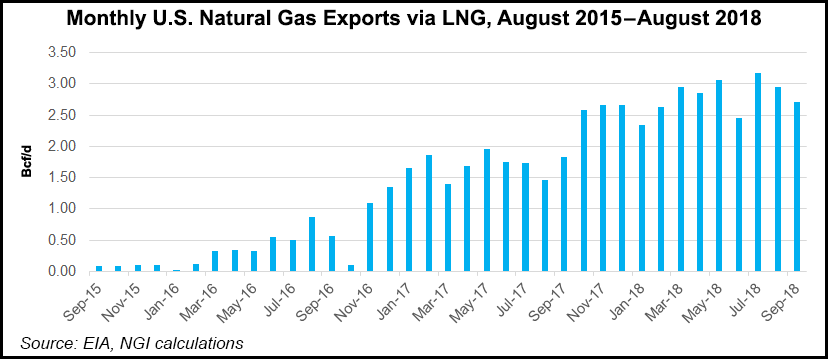NGI All News Access | Infrastructure
Texas OKs Air Permits for Rio Grande LNG Export Project in Brownsville
Texas regulators have OK’d a series of air permits to advance a liquified natural gas export project in far South Texas near the Mexico border.

Houston-based NextDecade Corp. said the Texas Commission on Environmental Quality (TCEQ) voted to approve three key air permits for the Rio Grande LNG project for the Port of Brownsville [No. 2018-1304-AIR].
“We appreciate the TCEQ’s commitment to the review of our project and are pleased to achieve another significant milestone in our efforts to deliver a safe and reliable LNG facility,” NextDecade CEO Matt Schatzman said. “We look forward to bringing thousands of jobs to the Rio Grande Valley and communities throughout the State of Texas, and to facilitating access to clean-burning, U.S.-produced natural gas for our customers around the world.”
NextDecade is developing a portfolio of LNG projects, including the 27 million metric tons/year (mmty) export facility in Brownsville. In addition, the complementary 4.5 Bcf/d Rio Bravo Pipeline would transport supply from the Agua Dulce hub, also in South Texas near Corpus Christi, to the export project.
As envisioned, the export terminal would entail six liquefaction trains, each with a nominal capacity of 4.5 mmty (i.e., a long-term average of about 0.6 Bcf/d), four LNG tanks (each with a capacity of 180,000 cubic meters), two marine jetties for ocean-going LNG vessels (with capacities of 125,000-185,000 cubic meters), one turning basin, as well as four LNG and two natural gas liquids truck-loading bays.
As proposed, LNG produced at the site also could be loaded onto trucks that would be used solely to supply truck-fueling facilities.
Infrastructure is to include twin 42-inch diameter pipelines running parallel, three 180,000 hp compressor stations, two 30,000 hp interconnect booster stations, six mainline valve sites, four metering sites along a 2.4-mile-long header system, as well as ancillary facilities.
The Rio Grande project remains subject to review by FERC, which in October issued a draft environmental impact statement (EIS) for the export project and associated Rio Bravo Pipeline. A final EIS is scheduled to be issued in April. The Federal Energy Regulatory Commission also has established an authorization deadline of July 25.
NextDecade expects to make a final investment decision in 3Q2019.
Texas Sen. John Cornyn filed an open letter with FERC in support of the project, citing economic reasons. “FERC’s final approval of this project will unleash the additional natural gas export potential of the U.S. and the state of Texas, driving significant economic, energy, trade and environmental benefits for generations to come,” he wrote.
Houston Mayor Sylvester Turner, a Democrat, also wrote to FERC that he supports the LNG project, citing its environmental benefits. Brownsville is about 360 miles from Houston. However, Turner, who is a member of Climate Mayors, cited the need to reduce air pollution across the state. Climate Mayors, a group of around 300 U.S. mayors, has pledged to uphold the United Nations’ global climate accord reached in late 2015 known as the Paris Agreement.
© 2024 Natural Gas Intelligence. All rights reserved.
ISSN © 1532-1231 | ISSN © 2577-9877 |
